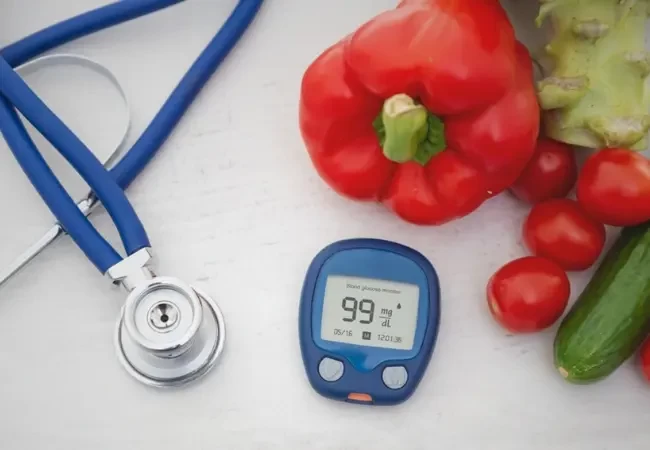Blog
Endocrine Disorders
Symptoms

Common Endocrine Disorders and Their Symptoms
The endocrine system is a group of glands that make and release hormones. These hormones control many important functions in your body like turning calories into energy for cells and organs. The endocrine system influences how your heart beats, how your bones and tissues grow, and your ability to have children.
Problems with the endocrine system occur when hormone levels are too high or too low or if your body does not react to hormones correctly. This will lead to issues like diabetes, thyroid problems, growth disorders, sexual problems, and other hormone-related conditions.
If you often feel tired and weak, it could be due to a hormonal imbalance causing endocrine disorders.
Causes of Endocrine Disorder
Endocrine disorders can be usually classified into two main types which are as follows.
- Endocrine disorders where a gland makes too much or too little of a hormone which causes a hormone imbalance.
- Endocrine disorders caused by the growth of lesions such as nodules or tumors in the endocrine system which might affect hormone levels.
The endocrine feedback system keeps hormone levels in the blood balanced. If there is too much or too little of a hormone, the feedback system tells the right gland to fix it. A hormone imbalance can happen if this system cannot keep the right hormone levels or if the body does not remove excess hormones from the blood properly.
Increased or decreased levels of endocrine hormones can be caused by:
- A problem with the endocrine feedback system.
- Disease.
- Infection.
- A genetic disorder like multiple endocrine neoplasia (MEN) or congenital hypothyroidism.
- A gland that fail to stimulate another gland to release hormones (e.g., an issue with the hypothalamus affecting the pituitary gland).
- A tumor in an endocrine gland.
- Injury to an endocrine gland.
- Most endocrine tumors and lumps are noncancerous and usually do not spread. However, they can affect the gland's hormone production.
What are the Symptoms of Endocrine Disorders?
Symptoms of endocrine disorders will vary depending on the gland involved. However, most people with endocrine issues will feel tired and weak. Some endocrine symptoms might make you think that you have a different illness. Thus, it is important to talk to your doctor if you experience these endocrine symptoms.
- Changes in your heart rate
- Changes in your eyes or skin
- Bone fractures
- High calcium levels
- High blood sugar levels
- Unexplained weight changes
- Low or high blood pressure
- Infertility
- Loss of sex drive
- Menstrual cycle problems
Different Types of Endocrine Disorders
There are many types of endocrine disorders. The most common one in the U.S. is diabetes. Other endocrine disorders are as follows.
- Adrenal insufficiency: The adrenal gland releases too little cortisol and sometimes aldosterone. Symptoms include fatigue, stomach upset, dehydration, and skin changes. Addison's disease is one type of adrenal insufficiency.
- Cushing's disease: The pituitary gland produces too much hormone which makes the adrenal gland overactive. Cushing's syndrome which is a similar condition can occur in people especially in children who take high doses of corticosteroid medications.
- Gigantism (acromegaly) and growth hormone problems: If the pituitary gland produces too much growth hormone, a child's bones and body parts grow too quickly. If there is too little growth hormone, a child’s growth in height can stop.
- Hyperthyroidism: The thyroid gland makes too much thyroid hormone which cause weight loss, fast heart rate, sweating, and nervousness. The most common cause is an autoimmune disorder called Grave's disease.
- Hypothyroidism: The thyroid gland makes too little thyroid hormone in this condition which lead to fatigue, constipation, dry skin, and depression. In children, it can slow development. Some types are present at birth itself.
- Hypopituitarism: The pituitary gland releases little or no hormones which are caused by various diseases. Women may stop getting their periods.
- Multiple endocrine neoplasia type 1 and 2 (MEN1 and MEN2): These rare genetic conditions cause tumors in the parathyroid, adrenal, and thyroid glands which lead to overproduction of hormones.
- Polycystic ovary syndrome (PCOS): The overproduction of androgens disrupts egg development and release from the ovaries which cause infertility.
- Precocious puberty: Abnormally early puberty happens when glands release sex hormones too soon in your life.
How the Diagnosis of Endocrine Disorder Can be Done?
Diagnosing an endocrine disorder is a complex procedure because the endocrine system regulates numerous bodily functions such as growth, metabolism, and reproduction. If your doctor suspects that you have an endocrine disease, they may refer you to an endocrinologist. This specialist will likely order specific tests to confirm the diagnosis. These tests will help identify hormone levels and how well glands are functioning. Understanding these results will help the doctor determine the best treatment plan for you. Thus, it is important to follow their guidance closely to manage any hormone imbalances and maintain your overall health. Below given are the following tests for diagnosing endocrine disorder.
- Blood Testing
- Urinalysis
- Ultrasound
- Fine Needle Aspiration
- Computerized Tomography (CT) Scan
- Magnetic Resonance Imaging (MRI) Scan Positron Emission Text (PET) Scan
Treatment of an Endocrine Disorder
You will need to see the team of expert endocrinologists and supportive care specialists who will provide top-notch treatment for endocrine disorders. Treatments might vary based on the type of disorder because each one affects the endocrine system differently. Treatment options may include:
- Medicines to balance hormones again and manage symptoms.
- Chemotherapy or radiation therapy for patients who have cancerous endocrine gland tumors.
- Surgery to remove tumors from glands that affect hormone production and levels.
Conclusion
Your endocrine system releases hormones that control how your body will grow and work. Problems with this system from genetics, infections, or other reasons can lead to disorders like diabetes, hyperthyroidism, or PCOS. Feeling tired or weak often might be a sign of an endocrine issue. Thus, it is important to see your doctor for diagnosis and treatment if you have these symptoms.
At Silverline Hospital, you can find the best Endocrinology specialty department that treats patients with hormonal problems causing various diseases including lifestyle issues like diabetes and obesity. Silverline Hospital, the best diabetes hospital in Kerala for endocrinology that offers complete care for hormone-related disorders. Our hospital provides advanced facilities for diagnosing and treating endocrine issues in adults, children, and adolescents including diabetes complications. We make sure that all our patients get the right care.

More Blogs
-

Struggling with Erection or Early Ejaculation? Here's How to Get Help
Struggling with erectile dysfunction or premature ejaculation? Learn common causes, treatments, and how to seek professional help with confidence.
-

When Should Diabetics Eat? Expert Tips on Meal Timing and Blood Sugar Control
Learn how diabetics can optimize meal timing to better control blood sugar. Expert tips for healthier, more balanced living.
-

Facing the Fear: Understanding Psychological Erectile Dysfunction Before Marriage
Discover the causes and solutions for psychological erectile dysfunction before marriage. Gain insight, support, and confidence for a healthy relationship.
-

Why Overweight Individuals Should Embrace Early Dinners
Ready to lose weight smarter? See why early dinners are a game-changer for overweight individuals aiming for lasting health and weight control.
-

Overweight? Start with This One Powerful Lifestyle Change
Struggling with weight? Most of us eat our heaviest meal of the day at night, usually after 9 or even 10 PM.


 Home
Home  Booking
Booking
 Chat Now
Chat Now  Call Us
Call Us